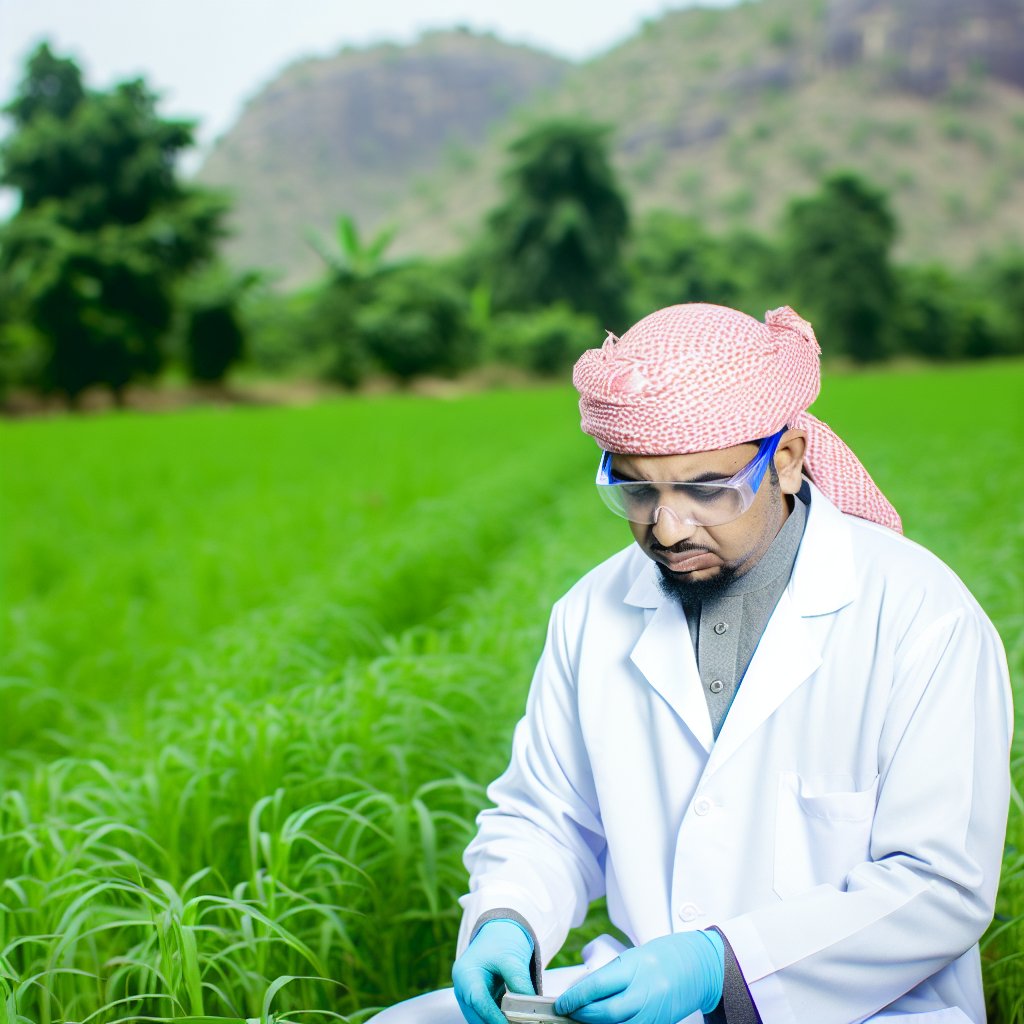Introduction:
Agricultural science projects play a crucial role in the education of Nigerian students.
These projects offer hands-on experience and practical knowledge.
They not only enhance students’ understanding of agriculture but also foster innovation and creativity.
By engaging in agricultural science projects, students can apply theoretical knowledge to real-world scenarios.
This develops problem-solving skills and critical thinking abilities.
These projects also provide a platform for students to explore new ideas and solutions.
Such engagement encourages them to think outside the box.
Furthermore, agricultural science projects offer students the opportunity to gain practical skills.
Skills include farming techniques, soil analysis, plant breeding, and pest control.
This hands-on experience is invaluable for students interested in pursuing a career in agriculture or related fields.
Through these projects, students can also learn about the importance of sustainable agriculture practices.
They gain insights into the role of agriculture in food security and economic development.
This holistic approach to learning helps students understand the interconnectedness of agriculture with other aspects of society.
Agricultural science projects provide a unique and engaging way for Nigerian students to learn about agriculture.
They help develop important skills and contribute to the future of agriculture in Nigeria.
These projects are essential for nurturing the next generation of agricultural innovators and leaders in the country.
Urban Farming Projects for Nigerian Students
When it comes to agricultural science projects for Nigerian students, urban farming projects can be a great idea to explore.
Urban farming involves setting up small-scale vegetable gardens in urban areas, which can have a positive impact on students and the community as a whole.
Benefits of Urban Farming Projects
Learning about sustainable agriculture practices is one major benefit.
Urban farming projects provide students with hands-on experience in sustainable agriculture practices.
They can learn about organic farming methods, composting, and water conservation strategies.
This knowledge is crucial for the future of agriculture in Nigeria, where sustainable practices are becoming increasingly important.
Another benefit is food security.
By engaging in urban farming projects, students can understand the importance of food security.
They can learn how they can contribute to ensuring access to nutritious food for their communities.
Understanding can help reduce the reliance on imported food products.
Urban farming projects can also promote community engagement and collaboration.
Students can work together with their peers, teachers, and local residents to plan, implement, and maintain the vegetable gardens.
This teamwork fosters a sense of responsibility and community spirit among students, which is essential life skills.
Through urban farming projects, students can also develop a deeper appreciation for the environment.
They can learn about the impact of human activities on natural ecosystems.
They can understand the importance of biodiversity, soil health, and climate change mitigation strategies.
This environmental awareness can inspire students to become advocates for sustainable agriculture.
Students can also motivate others to engage in environmental conservation.
Ideas for Setting up Small-Scale Vegetable Gardens
One idea is container gardening.
Students can start a container gardening project by using recycled containers.
They can grow a variety of vegetables like tomatoes, peppers, lettuce, and herbs in these containers.
This method is suitable for urban areas with limited space.
Another innovative method is vertical gardening.
Students can create vertical garden structures using pallets, hanging planters, or trellises.
Transform Your Career with Expert Guidance
Get personalized mentorship consulting that’s tailored to your unique path. Our expert advice is actionable and exclusive.
Get StartedThis method allows them to grow vegetables vertically, saving space and creating a visually appealing garden.
Community gardens are also a great idea.
Students can collaborate with their school or local community to establish a community garden.
Here, they can collectively grow vegetables.
Community gardens promote social interaction, shared responsibility, and access to fresh produce.
Students can organize gardening workshops, harvest festivals, and educational sessions to engage the community.
Rooftop gardens offer another option.
For schools or buildings with rooftop access, students can set up rooftop gardens to grow vegetables.
Utilizing raised beds, grow bags, or hydroponic systems allows them to cultivate crops like lettuce, spinach, carrots, and radishes.
Rooftop gardens can also help reduce heat absorption and improve air quality.
They provide a green space in urban areas.
Overall, urban farming projects offer numerous benefits.
They provide hands-on learning opportunities, community engagement, environmental awareness, and food security.
By implementing these ideas for setting up small-scale vegetable gardens, students can develop skills, knowledge, and values.
These will empower them to positively impact agriculture and society as a whole.
Crop yield improvement projects:
- Suggestions for experiments to test different methods for increasing crop yields
- Importance of this project in addressing food insecurity and promoting sustainable farming practices
Experiments to Test Different Methods for Increasing Crop Yields:
One possible project idea for Nigerian students in the field of agricultural science is to conduct experiments to test various methods for increasing crop yields.
This project can involve comparing different techniques such as intercropping, crop rotation, fertilization, and irrigation to see which method results in the highest yield.
By conducting these experiments, students can gain valuable insights into the most effective ways to improve crop productivity.
Addressing Food Insecurity and Promoting Sustainable Farming Practices:
The importance of this project cannot be overstated, especially in a country like Nigeria where food insecurity is a prevalent issue.
By finding ways to increase crop yields, students can contribute to addressing food shortages and improving access to nutritious food for local communities.
Additionally, promoting sustainable farming practices through this project can help ensure the long-term viability of agriculture in Nigeria.
Crop yield improvement projects offer students the opportunity to make a meaningful impact in their communities while gaining valuable knowledge and skills in agricultural science.
Learn More: Applied Zoology Fieldwork: What to Expect in Nigeria
Livestock Management Projects
Ideas for projects focused on animal husbandry and breeding practices.
- Setting up a poultry farm: Students can research and create a business plan for starting a poultry farm, including budgeting and marketing strategies.
- Improving animal nutrition: Projects can focus on creating balanced feed formulas for different types of livestock to ensure their health and productivity.
- Breeding techniques: Students can study and implement various breeding techniques to improve the quality of livestock breeds and increase yield.
- Disease management: Projects can focus on learning about common diseases in livestock and developing prevention and treatment strategies to ensure their well-being.
- Livestock housing design: Students can design and build innovative and cost-effective livestock housing solutions to improve living conditions for the animals.
Benefits of learning about livestock management for students interested in pursuing careers in agriculture.
- Practical skills: Students gain hands-on experience in animal care, breeding, nutrition, and health management.
- Entrepreneurial opportunities: Learning about livestock management can prepare students to start and run their own agricultural businesses.
- Industry knowledge: Understanding livestock management practices provides students with valuable insights into the agricultural industry.
- Career options: Students can explore various career paths in animal science, veterinary medicine, farm management, and agricultural research.
- Contribution to food security: By mastering livestock management, students can play a vital role in ensuring food production and sustainability.
Discover More: Interdisciplinary Approaches in Applied Mathematics
Sustainable agriculture projects:
- Suggestions for projects that explore eco-friendly farming methods, such as organic farming and permaculture.
- Importance of promoting sustainable agriculture to address environmental challenges and ensure food security.
Exploring Eco-Friendly Farming Methods:
One of the innovative agricultural science project ideas for Nigerian students is to focus on sustainable agriculture.
This involves exploring eco-friendly farming methods that promote environmental conservation and ensure the long-term productivity of agricultural systems.
Two key approaches to consider are organic farming and permaculture.
Organic Farming:
Organic farming is a method of agricultural production that avoids the use of synthetic chemicals such as pesticides, fertilizers, and genetically modified organisms.
Instead, organic farmers rely on natural processes and inputs to enhance soil fertility, control pests, and manage weeds.
By conducting a project on organic farming, students can learn about the benefits of this approach, including improved soil health, reduced environmental impact, and better nutrition in food products.
They can also explore the challenges and opportunities associated with transitioning to organic farming practices in Nigeria.
Permaculture:
Permaculture is another sustainable farming system that focuses on designing agricultural ecosystems based on principles observed in natural ecosystems.
By mimicking the diversity and interactions found in nature, permaculture aims to create productive and resilient food production systems that require minimal external inputs.
Students can explore various permaculture design principles, such as companion planting, water harvesting, and soil conservation techniques.
By implementing a permaculture project, students can learn how to create self-sustaining and regenerative agricultural systems that benefit both people and the environment.
Promoting Sustainable Agriculture:
It is essential to promote sustainable agriculture in Nigeria to address environmental challenges and ensure food security for future generations.
By encouraging the adoption of eco-friendly farming methods like organic farming and permaculture, the country can mitigate the negative impacts of conventional agriculture, such as soil degradation, water pollution, and biodiversity loss.
Sustainable agriculture practices also help smallholder farmers improve their livelihoods by increasing their resilience to climate change and market uncertainties.
Environmental Challenges:
Nigeria faces various environmental challenges due to unsustainable agricultural practices, including deforestation, soil erosion, and water scarcity.
By promoting sustainable agriculture, students can contribute to mitigating these challenges and protecting natural resources for future generations.
Through their projects, students can raise awareness about the importance of conserving biodiversity, preserving ecosystems, and reducing greenhouse gas emissions in the agricultural sector.
Food Security:
Ensuring food security is another critical reason to promote sustainable agriculture in Nigeria.
By implementing eco-friendly farming methods, the country can increase agricultural productivity, diversify food production, and reduce post-harvest losses.
Students can explore the role of sustainable agriculture in improving food access, nutrition, and income generation for rural communities.
By integrating sustainable practices into their projects, students can help address food security issues and contribute to building a more resilient and sustainable food system in Nigeria.
Implications of Sustainable Agriculture Projects:
Sustainable agriculture projects offer an excellent opportunity for Nigerian students to learn about innovative farming practices that promote environmental conservation and food security.
By exploring eco-friendly methods like organic farming and permaculture, students can contribute to building a more sustainable and resilient agricultural sector in Nigeria.
Through their projects, students can raise awareness about the importance of adopting sustainable agriculture practices for the environment and for the well-being of local communities.
By encouraging the next generation of farmers to embrace sustainable agriculture, Nigeria can work towards a more prosperous and sustainable future for its agricultural sector.
Gain More Insights: Pioneering Geologists in Nigeria’s History
Agricultural technology projects:
Ideas for projects that involve exploring the use of technology in agriculture, such as drones for crop monitoring or automated irrigation systems.
Benefits of incorporating technology into agriculture for increased efficiency and productivity.
Exploring the Use of Drones for Crop Monitoring:
Drones have revolutionized agriculture by providing farmers with real-time data on crop health and growth.
They can cover large areas in a short time, allowing farmers to monitor their crops more efficiently.
With the help of drones, farmers can detect pest infestations or nutrient deficiencies early, preventing crop damage.
Drones equipped with thermal sensors can identify areas of stress in crops, helping farmers take timely corrective actions.
Implementing Automated Irrigation Systems:
Automated irrigation systems use sensors to determine soil moisture levels and adjust water flow accordingly.
These systems help optimize water usage by delivering the right amount of water only where and when needed.
Farmers can remotely control irrigation schedules, saving time and labor while ensuring plants receive adequate moisture.
Automated irrigation systems reduce water wastage and minimize the risk of overwatering, leading to healthier crops.
Benefits of Incorporating Technology into Agriculture:
Improved Efficiency: Technology streamlines agricultural processes and tasks, saving time and resources.
Enhanced Productivity: By utilizing technology, farmers can increase their yield and profitability.
Sustainable Practices: Technology promotes sustainable farming practices by optimizing inputs and reducing waste.
Data-Driven Decision Making: Technologies like drones and sensors provide valuable data for informed decision-making.
Climate Resilience: Agricultural technology helps farmers adapt to changing climate conditions and mitigate risks.
Market Access: Technology connects farmers to markets, enabling better pricing and market opportunities.
Youth Engagement: Embracing technology attracts and retains younger generations in agriculture, ensuring its future success.
Agricultural technology projects offer immense potential to transform Nigerian agriculture.
By exploring innovative ideas and incorporating technology into farming practices, students can contribute to increased efficiency, productivity, and sustainability in the agricultural sector.
Embracing technological advancements will not only benefit farmers but also contribute to food security, economic growth, and environmental protection in Nigeria.
Learn More: Agricultural Economics Degree Programs in Nigeria

Climate change adaptation projects:
– Implementing drip irrigation systems to conserve water in agriculture.
– Developing drought-resistant crop varieties to withstand changing climate conditions.
– Introducing agroforestry practices to enhance soil health and biodiversity.
– Conducting research on climate-smart agricultural techniques for sustainable farming.
– Promoting the use of organic fertilizers to reduce greenhouse gas emissions.
Importance of understanding and addressing the challenges of climate change in agriculture:
Climate change poses a significant threat to global food security.
Extreme weather events such as droughts and floods can devastate crops.
Rising temperatures can affect crop yields and livestock productivity.
Adapting to climate change is crucial for long-term agricultural sustainability.
Farmers need to be equipped with knowledge and resources to cope with changing conditions.
Innovative solutions for sustainable agriculture
Climate change is a pressing issue that requires innovative solutions in agriculture.
Students can contribute to this field by developing projects that address the challenges of climate change.
Promoting sustainable farming practices is essential for future resilience.
By focusing on adaptation strategies, students can enhance agricultural systems’ resilience against climate changes.
Ideas for Food Processing Projects:
Creating homemade jams and jellies from fruits grown in Nigeria.
Making dried fruits and vegetables using solar dehydration techniques.
Producing natural fruit juices without added sugars or preservatives.
Benefits of Learning About Food Processing:
Enhances students’ understanding of food safety and quality control.
Provides practical experience in utilizing different food preservation methods.
Prepares students for careers in food science and entrepreneurship.
How to Get Started with Food Processing Projects:
Research different food processing techniques and their benefits.
Consult with local agricultural experts for guidance on processing local crops.
Invest in basic food processing equipment such as dehydrators and juicers.
Challenges in Food Processing Projects:
Ensuring proper sanitation during processing to prevent contamination.
Finding markets for processed products in a competitive industry.
Dealing with seasonal variations in crop availability for processing.
Tips for Success in Food Processing Projects:
Develop unique flavor profiles to differentiate your products in the market.
Collaborate with local farmers to access fresh produce for processing.
Stay up-to-date on food processing regulations and certifications.
Implications of Food Processing for Nigerian Students:
Food processing projects offer a valuable opportunity for Nigerian students to learn about food preservation, entrepreneurship, and agricultural innovation.
By exploring different processing techniques and creating unique products, students can develop practical skills and knowledge.
This can benefit them in future careers in the food industry.
Community engagement projects are a great way for Nigerian students to not only learn about agricultural science but also make a positive impact in their local communities.
These projects involve working with community members to address agricultural challenges and promote sustainable practices.
Suggestions for projects:
- Organizing workshops on modern farming techniques
- Setting up community garden initiatives
- Creating awareness campaigns on the importance of soil conservation
- Developing partnerships with local farmers to improve crop yields
- Establishing farmers’ markets to promote local produce
By engaging with local communities, students can learn firsthand about the challenges faced by farmers and the best practices for addressing them.
This hands-on experience not only enhances their knowledge but also allows them to contribute to the overall improvement of agricultural practices in Nigeria.
Importance of engaging with communities:
- Promotes knowledge sharing and collaboration
- Builds strong relationships between students and community members
- Encourages a sense of ownership and pride in local agricultural projects
- Leads to the development of innovative solutions to agricultural challenges
- Enhances food security and promotes sustainable farming practices
Community engagement is essential for promoting sustainable agriculture practices and ensuring food security in Nigeria.
By involving local communities in agricultural science projects, students can make a real difference and contribute to the development of a thriving agricultural sector in the country.
Implications of Agricultural Science Projects for Nigerian Students
Recap of the significance of agricultural science projects for Nigerian students: Agricultural science projects provide hands-on experience and practical skills to students. They help students understand the complexities of agriculture in Nigeria.
Encouragement for students to explore these ideas and contribute to the development of agriculture in Nigeria: Students should take on agricultural science projects. This involvement allows them to gain valuable knowledge. Moreover, they can make a positive impact on the agricultural sector. Contributing to sustainable development is crucial for Nigeria.
By exploring these ideas, students can innovate and experiment. They will find solutions to challenges facing agriculture in Nigeria. Their efforts can lead to improved crop yields and enhanced farming techniques.
Introducing new technologies can revolutionize the way agriculture is practiced in the country. Students should embrace opportunities to engage in agricultural science projects.
This engagement benefits their academic growth. It also plays a crucial role in shaping the future of agriculture in Nigeria.
Additional Resources
Nigeria – National Agricultural Research Project
“INFLUENCE OF LIBRARY INFORMATION RESOURCES AND …
[E-Books for Sale]
The Nigerian Professional's Playbook: Strategies to Accelerate Your Career and Build Lasting Wealth
₦2,000 • 10 Chapters • 33 pages
Fed Up with Stagnant Salaries and Career Frustration? Grab the Proven Nigerian Playbook for Just ₦2,000!
See All 10 Chapters of this E-Book
500 Cutting-Edge Tech Startup Ideas for 2024 & 2025: Innovate, Create, Dominate
₦3,000 • 500 Tech Startup Ideas • 62 pages
You will get inspired with 500 innovative tech startup ideas for 2024 and 2025, complete with concise descriptions to help you kickstart your entrepreneurial journey in AI, Blockchain, IoT, Fintech, and AR/VR.
See All 500 Tech Startup Ideas of this E-Book
Mastering Project Management: A Comprehensive Guide to GanttPRO and Microsoft Project
₦3,150 • 10 Chapters • 102 pages
Explore 'Mastering Project Management,' an e-book guide on using GanttPRO and MS Project for optimal project success.
See All 10 Chapters of this E-Book
Migration Mastery: From Nigeria to Abroad
₦2,450 • 30 Chapters • 244 pages
Unlock success in your migration from Nigeria with our e-book. Comprehensive guide for a smooth transition abroad.
See All 30 Chapters of this E-Book
The Future of Work in Nigeria: Trends, Professions, and Possibilities
₦3,500 • 24 Chapters • 188 pages
Navigate Nigeria's evolving job landscape with our e-book on the future of work. Gain key insights into tech innovations and cultural shifts. Stay ahead; purchase today.
See All 24 Chapters of this E-Book
50 Simple Tips to Stay Ahead of Your Peers
₦1,750 • 5 Chapters • 25 pages
Master success with '50 Simple Tips to Stay Ahead of Your Peers'. Unlock strategies to outshine and excel in every aspect of life.








